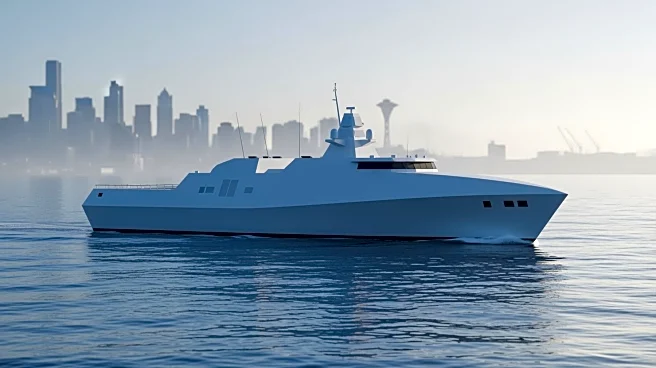What's Happening?
Anduril, an American technology firm, has announced its collaboration with HD Hyundai to develop unmanned vessels for the U.S. Navy's Modular Attack Surface Craft (MASC) competition. This initiative marks
a significant development in the U.S.-Korea shipbuilding partnership. The unmanned vessels, designed for oceangoing missions, will be built in Seattle for low-rate production. Anduril's new family of Unmanned Surface Vehicle (USV) designs will be autonomous, modular, and ready for mass production. These vessels will be capable of flexible mission payloads, including intelligence, surveillance, reconnaissance (ISR), electronic warfare, and strike operations. The design philosophy emphasizes software integration to maximize hardware interchangeability and minimize vendor lock-in during the sustainment phase. The first prototype is being constructed in Korea, leveraging HD Hyundai's advanced capabilities, with plans to transition production to the Foss Shipyard in Seattle.
Why It's Important?
The collaboration between Anduril and HD Hyundai represents a strategic move to enhance U.S. naval capabilities through advanced unmanned technology. This development is crucial for expanding the U.S. shipbuilding capacity, particularly in the Pacific Northwest, a region with a rich maritime legacy. The initiative aims to re-energize American shipbuilding and grow the maritime workforce, leveraging the region's infrastructure, supply chain depth, and skilled labor. By maximizing automation in production, Anduril seeks to increase efficiency and precision in building structural and mechanical components. This project could significantly impact the U.S. defense industry, providing advanced technological solutions for naval operations and potentially influencing future military strategies.
What's Next?
Anduril plans to build up production capacity at the Foss Shipyard in Seattle, which will serve as the home base for integration and testing of the unmanned vessels. The shipyard, previously shut down in 2021, will be revived to support this initiative. The collaboration with robotics firm Hadrian will enhance automation during production, utilizing precision automation and rapid fabrication capabilities. As the project progresses, stakeholders in the maritime and defense sectors will likely monitor its impact on U.S. naval capabilities and the broader shipbuilding industry. The successful implementation of this project could lead to further advancements in unmanned naval technology and strengthen U.S. military operations.
Beyond the Headlines
The development of unmanned warships by Anduril and HD Hyundai could have broader implications for international naval strategies and defense policies. As countries increasingly invest in autonomous military technologies, this project may influence global defense dynamics and prompt other nations to pursue similar advancements. Additionally, the emphasis on modular and upgradeable designs reflects a shift towards more adaptable and sustainable military solutions, potentially setting new standards in naval engineering and technology.









